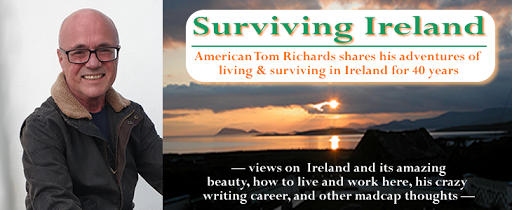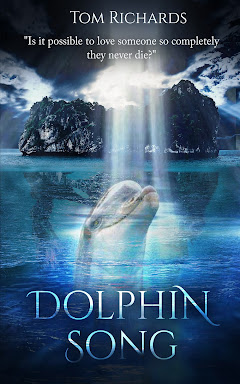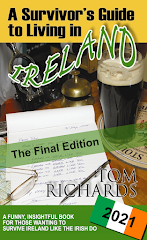 |
| Scariff Island, off the coast of Eyeries |
Her: "It's so lovely talking to you, Tom. But you haven't told me where you live."
Me: "Ah, somewhere overseas."
Her: (eyes twinkling) "Really? Are you in the military? Where are you posted?"
Me: "No Ma'am. Actually, you see, I live in Ireland."
Her: "Oh I love Ireland! How long have you lived there?"
Me: (gulp) "For thirty-six years."
Her: (after a shocked beat of silence) "Is someone forcing you to stay there? Don't you want to come home?"
Me: "Actually, Ma'am... I'm an Irish citizen now. You see, Ireland is my home."
She studies me closely.
Her: "How can you say that? You told me you were born in Chicago." (she bristles a bit). "Don't you like America anymore? It's the greatest country in the world. We're making it even Greater! (glaring hard at me). "If you're a REAL American you'll come home right now!"
Then she turned on her heal and walked away in a huff. And all I can do is sigh.
This sort of conversation comes up with my fellow Americans again and again: when I'm in the States visiting; on airplanes when I'm travelling; even in my local pub where I'll be having a quiet pint and engage in conversation with an American tourist or two.
So why have I stayed in Ireland for all these years? The answer is: because I've fallen in love with it.
Five Reasons Why This Yank Stays In Ireland
Many Americans I meet simply cannot (or choose not to) understand why I continue to call Ireland my home. It's about time I came clean:
1. A Future for my Children and Grandchildren
When I first moved to this country in 1982, Ireland was just shy of a banana republic. The country was in the depths of a horrific recession. Over 17 percent of the workforce was out of a job. Infrastructure was non-existent. Interest rates approached 20 percent. Hell, I couldn't even get a telephone. The plight of the country made me think I'd made the biggest mistake of my life.
And frankly, I was worried for my children. I wondered: Would they ever be able to carve out a future in Ireland?
Over the years, however, Ireland has pulled its socks up. Today, it is one of the most successful countries in the world. Unemployment is at an all time low. Infrastructure (at least near major cities and towns) has been fully modernized. The country is renowned for its diversified industry. It is a center of excellence for I.T., pharmaceutical, food, agriculture, and a wide range of other industrial segments. The country's artistic endeavors (everything from painting to creative writing to the film industry) are flourishing.
Today, I can even get a telephone!
But back in 1995, desperately homesick for America and fed up with my life as an Ex-pat, I came very close to loading my family onto a plane for a move back home. Before taking that irreversible decision, however, I compared notes with friends living in the United States. What I found changed my life.
Ireland has some of the best education in the world. The country's primary and secondary schools ensure that students become truly literate in the fundamentals to succeed. As importantly, they begin the process of learning how to think for themselves. Ireland's universities and technical colleges offer students a wide range of first-rate subjects that are crucial for success in a growing world economy. Depending on the major, they also receive practical, hands-on education and training.
Since making the decision to stay permanently in the country (like forever) my children have fared well: a daughter with a degree in business studies; another daughter with a degree in marine science; a son with a PhD in the Irish language. My kids' success are a reflection of the educational opportunities available to anyone living in this country.
And the cost? Recently I had a conversation with an American friend of mine who is facing the daunting financial task of putting his own children through college.
Him: "We've been saving forever and we're almost there. By God we can afford to send the kids to college!"
Me: "Why that's terrific! Do you mind if I ask: what's it costing?"
Him: "Well, one of the kids is going to an Ivy League college. The second will follow in two years. They'll attend an in-state school where tuition is a bit cheaper. So..." he breaths in deeply, "it should only work out to 250 or so."
Me (impressed): "Two hundred and fifty dollars a year, each? That's terrific!"
Him: "No. Two hundred and fifty thousand. For the lot! Of course that's only for the tuition and fees. We'll have to work on room, board and spending money. Fortunately, the kids are both eligible for student loans. We'll take a 2nd mortgage on the house. But at the end of it," (I can hear him grin victoriously) "the total debt will be less than a hundred grand. Which is amazingly low compared to many."
Me (shocked): "Well hey Fred, that's just terrific."
Him: "Sure is. Ah, Tom, do you mind if I ask... what did it cost you over there in the Emerald Island?"
I think hard, trying to figure out how not to destroy him.
Me: "Well, you know, all the kids have finished college now. But it was pretty affordable."
Him: "Affordable. As in?"
Me: "Well, ah, er, about 10K per kid per year."
Him: (a moment of deep silence) "Do you mean like three kids x four years x 10k per year? That's a total of $120 k for them all? But that's just tuition, right?"
Me: "Actually, Fred, that's the whole taco. Tuition, room and board, spending money..."
Him: (getting a bit ridiculous) "But, and I'm not saying anything bad here, the colleges were sort of, what, sort of third rate? They're a bit dumb?"
Me: (my turn to bristle): "Actually, Fred, they're some of the best around."
Him: "What kind of loans do the kids have? What kind of loans do you have?"
Me: "Well, we don't have any loans. None. Nothing. Nada."
Him: "Oh."
And he hung up.
2. You Ain't Going to Go Broke if You Get Sick
A few years back, Dad had keyhole surgery. Obviously, he went to hospital. What was supposed to be a simple out-patient procedure grew a bit more complicated: he was force to stay two nights.
A month later he received the bill. I saw it and was astonished: $80,000. Fortunately, Dad has excellent medical insurance.
In Ireland, we all bitch and moan about our health system. However, seeing Dad's bill got me thinking. I checked with a local medical practitioner and asked the question: "If I had to go through the same procedure as Dad, what would it cost me in Ireland?"
The answer: A little less than $1,500. And that includes everything.
Like the UK, Ireland has socialized medicine. We pay a great deal in taxes for this privilege, and the down-sides of public health can be frustratingly cruel (complete disclosure: we have a very high incidence of troubling 'trolley-times' - meaning that those coming into hospital can wait days for a bed and are forced to wait on a trolley, often in a public area. It's an outrage that health professionals are trying to address - but it will take forever). However, despite this I have the comfort of knowing:
Drugs - no matter what I'm prescribed, it will cost me a maximum of a little less than $200 per month
GP visits - average approximately $70 per visit.
Hospital visits - on public health, max out at about $1000 per year no matter how many days I may have to stay in hospital.
Public health services have many challenges. For instance, Ireland would not have the most advanced healthcare sciences or procedures in the world. For those, by all means go to America! But here, and particularly as I grow older, I know one fact:
No matter what my body or mind might face, I know I will not go broke.
3. It's Safe Here
Open an American paper or any online News site and you'll invariably find a report of the latest daily shooting, with scores of people - often children or teens - dead.
In Ireland we don't have that problem and for a simple reasons: most weapons are outlawed.
As a gun owner in the United States, and a used-to-be fervent supporter of the 2nd Amendment, it took me years to get my head around this. However, as the years passed I grew up.
While Ireland has murders (and the murder rate is increasing), most assaults do not involve guns. Certainly, Ireland has never experienced a mass school killing. No one walks into a newspaper office with an assault rifle. Here, guns are the exception rather than the rule.
Yes, you can apply for a permit to hold a shotgun or small caliber rifle. But automatic weapons and handguns of any kind are verboten. It's that simple.
Here, I don't have to worry that my grandchildren will die when they attend school. Here, I will in all likelihood never be assaulted by a thief holding a Glock.
Here I know that my loved ones are safe.
As time goes on I find I simply do not understand many American's obsession with guns, or their die-hard attitudes of protecting so-called rights associated with extreme views of the 2nd Amendment. For me it's simple:
Kids first. Guns decidedly second. In Ireland, our gun laws uphold this simple value of protecting life.
4. The People
It's true. The Irish are probably some of the most friendly bunch of people in the world. I like these good folks. Heck, I've come to love the Irish.
Their good humor, welcoming nature, intelligence, and caring attitudes entranced me years ago. There is a gentleness in these people that is hard to describe or define.
All I know is I'm comfortable with these folk. And while I am not Irish at all (except by naturalization), and have no Irish blood in me, I can finally say:
I feel one with the people of this country because they have given me my home.
5. The Beauty of Finding Home
Eight years ago I moved to Eyeries, a small village of just over 60 souls located on the Atlantic coast, way, way down in the southwest of Ireland.
It is magic.
Each morning I sit at my dining room table, sipping a cup of coffee, gazing out at the serenity of Coulagh Bay and the Atlantic beyond. If I sit at the outside table I can hear the surf crash onto the rocky coastline only a half-mile away. I hear gulls scream as they search for their morning meal, and smell the fragrance of salt spray mixed with budding gorse and fuchsia.
I close my eyes and take a breath. I feel the sun on my brow and the wind in my face. I'll spend the day writing upstairs then eat with my partner and go out for a pint or two with my mates up in Causkeys.
Here, there is little divisiveness over political issues. Here, we do our best to listen and make a bit of room for each other because most are reasonable creatures. Here, we do not call each other names (except in jest) and do not embrace hate.
Yes, Ireland continues to face many challenges. Its housing costs are once again astronomical. Its debt mountain intolerable. The cost of living is once again soaring.
But... and a big but...
Here, I think I've finally found a little corner of the world to call my own. A place, me-thinks, that approaches heaven.
Here, I have found my home.
2018 Edition: A SURVIVOR'S GUIDE TO LIVING IN IRELAND NOW AVAILABLE!
A Perfect Gift for Saint Patrick's Day.
A Perfect Gift for Saint Patrick's Day.
If this blog interests you and you want to learn more about Ireland why not consider purchasing A SURVIVOR'S GUIDE TO LIVING IN IRELAND 2018 EDITION.
Are you thinking about living and working in Ireland? Would you like to move to Ireland? Do you want to know how to get an Irish Work Visa?
Do you need to know how Brexit and Trump policies may affect your plans? If so, consider purchasing the 2018 EDITION OF A SURVIVOR'S GUIDE TO LIVING IN IRELAND by Tom Richards.
Now almost 90,000 words long, this book could make the perfect gift for those interested in this wonderful country. Over 14,000 people have now learned how to live, laugh, and drink like the Irish by reading this Kindle ebook. I hope you enjoy, and my very best - Tom







